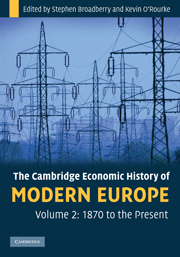Foreword
Published online by Cambridge University Press: 05 August 2012
Summary
It would be unthinkable for American undergraduates to be offered courses in the economic history of their own state, rather than the United States as a whole. In sharp contrast, most existing textbooks on European economic history are country-specific, implying the risk that students will misinterpret continent-wide phenomena as having been purely national in scope, and as having had purely national causes. The time has come for a textbook on European economic history that takes an explicitly pan-European approach, with the material organized by topic rather than by country.
This project thus aims to provide a unified economic history of modern Europe, explicitly modeled on R. Floud and D. McCloskey's (1981) path-breaking Cambridge Economic History of Britain. Each chapter has been written by two or three leading experts in the field, who between them have been able to cover all of the three major European regions (northern Europe, southern Europe, and central and eastern Europe). Following the pattern established by Floud and McCloskey, we have broken down the project into two volumes covering the periods 1700–1870 and 1870–2000. Each volume contains chapters based on the dominant themes of modern economic history: aggregate growth and cycles; sectoral analysis; and living standards. The approach is quantitative and makes explicit use of economic analysis, but in a manner that is accessible to undergraduates.
- Type
- Chapter
- Information
- The Cambridge Economic History of Modern Europe , pp. xvii - xviiiPublisher: Cambridge University PressPrint publication year: 2010



